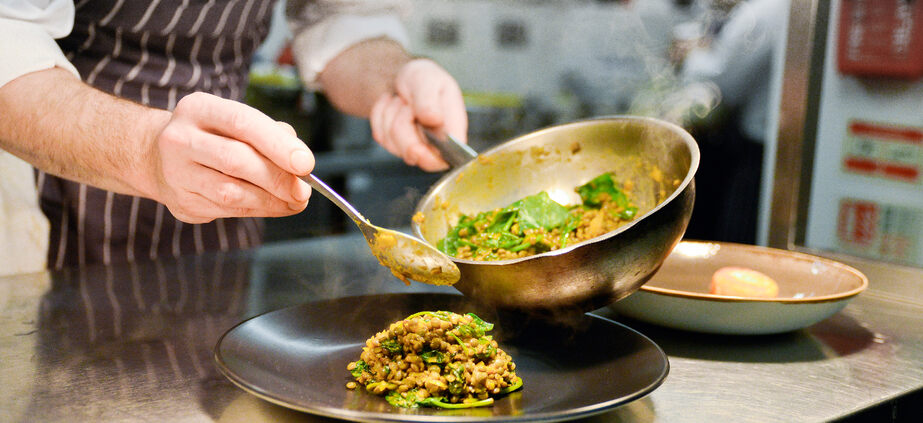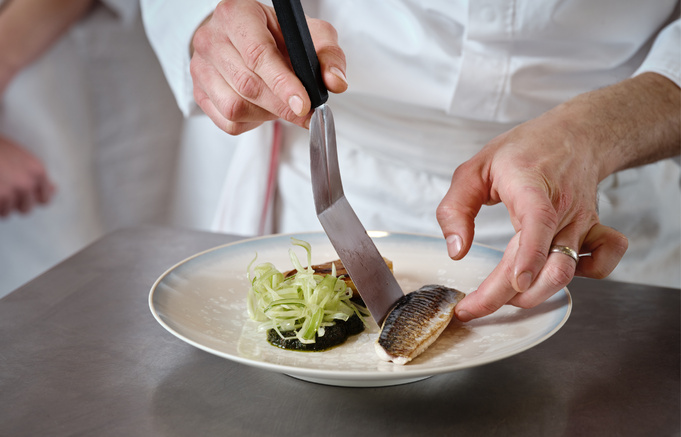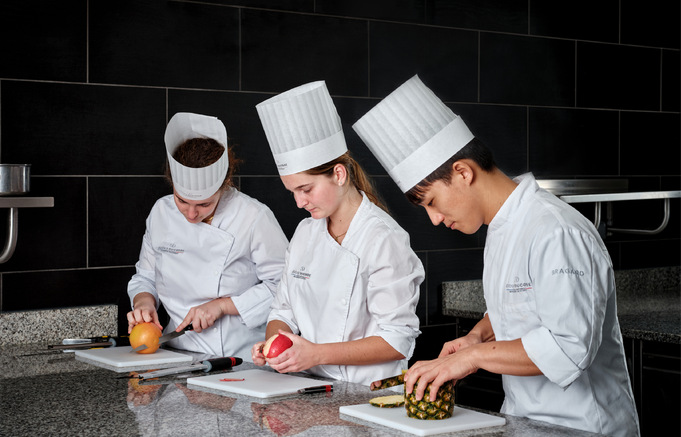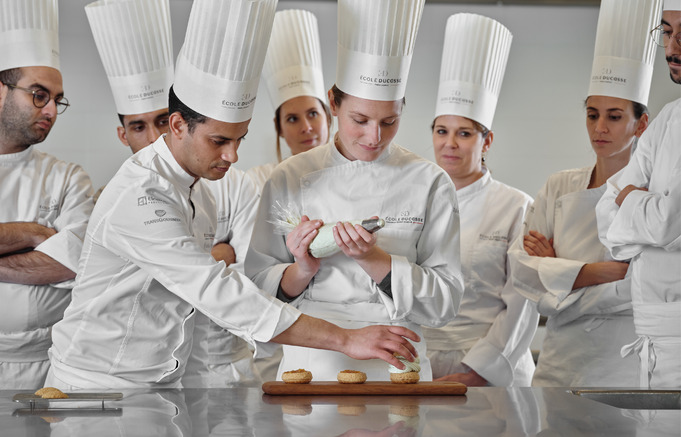Mastering the art of chef skills

If you love cooking, you may have thought about starting a culinary career and becoming a chef. Chefs work in the hospitality industry and are the creative force behind the delicious food at restaurants, cafes, bars, and brasseries.
Becoming a chef means developing many skills. Not only do you have to know how to prepare and handle food, but you need to plan menus and manage the smooth operation of a kitchen and manage staff such as other cooks, assistants, and waitstaff.
There's a lot to learn, but if you choose the right culinary arts degree, you'll be able to master all the vital skills you'll need as a chef.
In this blog, we'll go over the expertise needed to be a chef, including basic cooking techniques, and advanced skills needed to work in any professional kitchen. We'll also discuss how you can acquire these skills by studying at a culinary school or even a French pastry school.
What are chef skills?
If you're looking at a chef career, there are many competencies you'll need. When you start work in the food industry, there are chef skills any employer will expect you to have so that you can quickly and easily acclimatize to the work environment and your duties.
Why are chef skills so important?
Chef skills are vital because a professional kitchen is a busy, time-sensitive, and challenging place to work. Chef skills help ensure that you can focus on all your tasks and prioritize what needs to be done, ensuring that your part of the food service industry runs smoothly.
It's vital to hone skills in cooking and culinary techniques, no matter what type of chef you want to be. There may be differences in how much cooking you do daily as a station chef, head chef or executive chef, but all of these careers require a thorough knowledge of handling food. This will enable you to execute dishes as well as plan menus or design new culinary experiences for your clientele.
Types of chef skills

Chef skills typically fall into several categories.
- Technical skills: This is all about the technical side of cooking. This can be split into fundamental skills and more advanced skills.
- Creativity: Being able to come up with new culinary ideas and flavor combinations.
- Management skills: Chefs frequently have to manage other kitchen staff, including sous chefs or the whole kitchen.
- Business skills: Chefs often need to know about the business side of the restaurant industry, including marketing, budgeting, and inventory management.
- Communication and teamwork: You'll need to know how to work with other people and communicate well.
Fundamental chef skills
These comprise many of the essential cooking skills that chefs need to have. Some chefs may not do much actual cooking in their daily duties, but they still need these skills to assist other kitchen staff, devise menus, and direct the style of food offered by the eatery. Here are some of the essential skills.
Knife skills
Knives are one of the most basic tools in a kitchen, and a chef needs to be able to handle them safely, as well as know which knives to use for different tasks. A chef cannot risk ruining ingredients by using the wrong knife. A chef needs to know:
- Types of knives and their uses
- Proper knife handling and safety
- Knife sharpening and maintenance
Heat management
As so much food preparation involves cooking, chefs need to know heat management. This includes training in how to cook different ingredients using different temperatures or heat sources. Different heat sources can produce very different results, for example when boiling or frying the same ingredient, and chefs need to understand:
- Heat sources
- Controlling heat with different cooking methods
- Temperature control and monitoring
Flavors and seasoning
Knowing how to combine flavors is vital for designing menus and coming up with new creative dishes. A professional chef with training from a culinary school should understand complementary flavors and whether a dish requires more seasoning with a knowledge of:
- Basic flavor profiles
- Using herbs and spices to enhance flavor
- Proper salt usage
Kitchen safety and sanitation
With sharp objects, hot objects, and more, the kitchen can be a dangerous place. Chefs need to know how to properly handle their equipment. Food safety is also important to avoid making guests ill, so chefs need training in:
- Food safety practices
- How to minimize risk of injury
- Kitchen sanitation and cleanliness
- Personal hygiene and food handling
Advanced chef techniques

While many of the listed competencies should be known by most cooks and kitchen workers, there are also more advanced skills that professional chefs should have.
Meat fabrication
This is the term for turning a carcass or piece of meat into the proper portions. This includes separating out different cuts of meat as well as preparing them properly for cooking, as well as:
- Understanding different cuts of meat
- Fabricating poultry and seafood
- Proper cooking techniques for different meats
Sauce making
Many restaurants will have a chef dedicated to making sauces. This can be a complex and delicate area of cooking, which includes:
- Preparing base sauces
- Using herbs and spices to enhance flavor
- Cooking sauces expertly and with the right consistency
Sous vide cooking
While sous vide is not a traditional cooking method, it can be an important skill for chefs to have, involving:
- Understanding the sous vide technique
- Knowing the equipment and tools needed
- Thinking of creative uses for the sous vide method
Molecular gastronomy
Molecular gastronomy focuses on the science of cooking. It can harness the chemistry of cooking and allow chefs to create new and unusual dishes by:
- Understanding the science of molecular gastronomy
- Deconstructing techniques and ingredients
- Developing innovative dishes and approaches
Plating techniques
As well as being delicious, food has to look exciting and appealing for guests. Food can be arranged to enhance enjoyment, when chefs:
- Understand practical plating principles
- Are aware of composition and presentation
- Use color, texture, and contrast to create eye-catching plates
Essential chef tools and skills
There are many skills chefs need for using specific kitchen equipment. A chef needs to be comfortable with a range of equipment and use it as part of their culinary arts.
Cookware
Chefs should know which pieces of cookware will yield the results they want. This includes knowing the properties of specific items that home cooks will not be familiar with, and extra information including:
- Essential pots, pans, and baking dishes
- Different materials and their uses
- Proper cookware care and maintenance
Smallwares
These include items from measuring spoons to knives and whisks. Many chefs have a preference for which tools they use, and they'll need to have experience and competency in:
- Small kitchen tool safety
- Choosing the right tools for the job
- Proper care and maintenance
Appliances
From ovens to fryers to microwaves, there are many appliances that chefs need to be comfortable using, along with:
- Large appliance operation
- Choosing the right appliances for the job
- Proper appliance care and maintenance
Tips for improving chef skills
If you want to improve your kitchen skills, there are things to focus on.
- Practice and repetition: For handling tools or learning cooking methods, practice is vital.
- Continual learning: There are always new things to learn, and you should never stop trying to improve.
Other chef skills

There are other important skills for chefs to know, including:
- Time management
- Communication and collaboration
- Inventory management
- Financial skills
- Multitasking
- Team management
- Leadership skills
- Organizational skills
What is the best way to learn culinary skills?
One of the best ways to learn the chef skills you need for a successful career is by studying at a culinary school. There are many different courses that a culinary student can choose from, such as a bachelor in French pastry arts if you want to specialize in patisserie and become a pastry chef, or general courses to give you a great background of knowledge for any role in a professional kitchen.
World-leading culinary degrees designed for success
Our immersive courses combine practical skills, management experience, and professional internships to provide all the ingredients for a dynamic career.
If you're looking at changing direction and want to work in the culinary world, you can also study at a culinary school. There's a wide range of courses for career changers that will provide the necessary skills and experience.
Intensive diploma for starting a career in the culinary arts
Combining practical and entrepreneurial skills, this course is a platform for anyone who wants to launch their career as a chef or even start their own business
Chef skills: conclusion
A successful chef will need many skills for the challenging yet rewarding career of working in a professional kitchen. Many of these are kitchen-based skills, but you'll also need to have expertise in managing a team, prioritizing tasks, and creating new and unique menu items. Find out more about what you can do with a culinary degree or apply today to start your exquisite culinary journey with Ecole Ducasse.
Photo credits
Main image:
PhotoAlto/Neville Mountford-Hoare/PhotoAlto Agency RF Collections via Getty images


